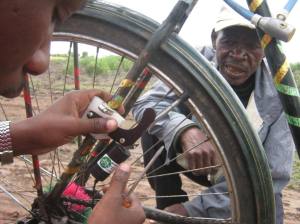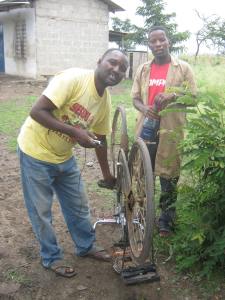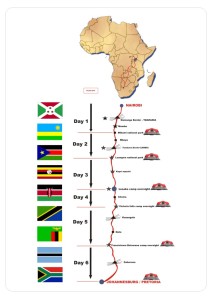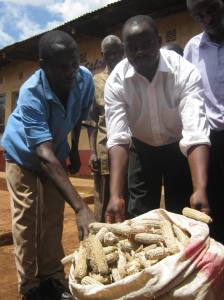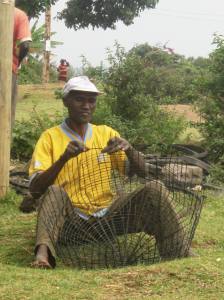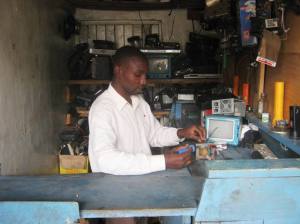February 25, 2010
Pedal Power Progress in Arusha
The cell phone, seen charging above, is juicing with just the power generated from a single speed bicycle. In Arusha, Tanzania we have met up `with a main technology partner for the road show, Global Cycle Solutions, and it has been very exciting. But before jumping to our day with the amazing pedal powered cell charger, a little background.
Global Cycle Solutions (GCS) was spun off from innovative research and field work done at the Massachusetts Institute of Technology (MIT). GCS was founded as a for-profit social enterprise by a team of MIT collaborators in July 2009. The students won a top prize at the MIT 100K business plan competition, and from that prize money they were able to launch an African headquarters in Arusha.
GCS sells bicycle attachments which have the ability to create jobs and incomes for individuals living at the bottom of the economic pyramid. Their first product for GCS was a maize sheller, painted blue in the picture above. Most farmers in Sub-Saharan Africa are shelling their maize crop by hand, a labor intensive and time consuming process. The sheller works at a pace 40 times faster than the traditional method.
After checking out the GCS HQ and the sheller we headed out to learn about the exciting pedal powered cell phone charger. The Road Show advance team was lucky enjoy to arrive into Arusha just as the new innovation from Global Cycle Solutions was ready for its first round of product testing. The charger was invented Bernard Kiwia, pictured above. Bernard was working as a bike mechanic when three years ago he attended a design conference called the International Development Design Summit. While there, he met innovators from around the world. When he arrived back into Arusha, he was changed forever and had a new urge to create.
During the months after the design conference, Bernard began to experiment with all types of pedal powered devices and bicycle inspired machinery. Devices ranged from a pedal powered hacksaw, to a windmill from bicycle parts, to the pedal powered drill press seen above. While many of the devices he created did not have commercial appeal, there was one that he knew had market potential, a bicycle cell phone charger. As a working design was born, Global Cycle Solutions was also beginning to develop and a partnership offered the perfect channel for the invention to reach a point of scaling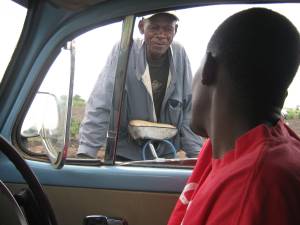
Nearly two years after the Bernard’s conception of the idea, the device is finally ready to hit the market. Bernard invited us into his antique VW Beetle and we set out to distribute the latest version of the design to be tested in a village outside Arusha this is not connected to the grid. After cruising down a dusty road for a few minutes, we came upon a gentleman on a bike and Bernard inquired if he owned a Nokia phone. When he answered positively, Bernard explained in Ki-Swahli what he could offer, and after a look of disbelief, a big grin came over the man’s face.
And so, on the side of a quiet rural Tanzanian road, Bernard armed himself with a screw driver and a pedal power cell phone charger and went to work on his installation. Between the sky blue VW Beetle and open Tanzania countryside, the scene was almost surreal.
The device is actually quite simple, the majority of the parts come from recycled bicycles, and the generator that charges the phone is the same used in old radios. The pricing that Global Cycle Solutions is looking at is around $10 USD.
When Bernard demonstrated that the charger worked and could easily detaches from the bicycle, relieving some theft concerns, what we saw was a very happy customer. After taking down the number of the phone, for further feedback on how the device is running, we jumped back into the Beetle and saw an even bigger grin on Bernard’s face.
The road show crew wondered why Bernard had chosen to do the installation on the roadside and not at a more populated area, but when we stopped at a local shop to install on another bicycle, we saw why. As soon as word got out what Bernard was offering, a crowd gathered and everyone clamored to get a device on their bicycle.
One gentleman, who had no power in his cell phone when we met him, immediately turned over the bicycle and began to charge. Bernard told us that this would often happen when he first installed the device. When we left the scene and headed home, there was a scent of the start to something big in the air.
The Tech Road Show falls at a perfect moment for Bernard, Global Cycle Solutions and the pedal powered cell phone charger and it is a prime example of why we are driven to make our World Cup program happen. To spread technologies like the maize sheller and phone charger to rural villages, you cannot reach them with a TV spot or newspaper advertisement, you must find a way to demonstrate it to them face to face. And not only will the technology proprietors gain from the demonstrations and exhibitions, but perhaps a youth will see the device will go down the road of Bernard adn realize they too have the power of innovation…
February 19, 2010
The Ultimate World Cup Celebration
The road show crew has delayed our trip into Tanzania for an extra week to join forces with an up and coming East African bus company called Kampala Coach. We heard that they were planning a big World Cup celebration of their own, and so we decided to take a day in Nairobi to meet with their General Manager, Jack Okoth. When we found out their plans, one extra day turned into an extra week to finalize a plan to work together to carry out the ultimate world cup celebration.
Jack’s team at Kampala Coach was already planning the Nomad Safari, an opportunity for the comprehensive traveler who wants to reach South Africa on a budget. It offers an affordable and exciting way to reach the 2010 FIFA World Cup. Individuals can depart from Rwanda, Uganda, Kenya, Tanzania, or Zambia and travel on brand new luxury buses to South Africa.
Along the way they will sample Africa’s greatest land marks, sights, and nightlife, staying at pre-selected campsites providing full board and accommodations en route. Fans on the Nomad Safari will spend 12 days touring landmarks and landscapes and get the option of spending 5, 7 or 10 days in South Africa. (www.kampalacoach.com)
When our team explained the idea of putting up big screens to bring attention to social issues, the Kampala Coach team became extremely enthusiastic, and so we developed the idea further into “super football fun parks” where for all 30 days of the world cup social events could take place. The super football fun parks would be community spaces the size of a football pitch where large numbers of urban and rural populations across Eastern and Southern Africa can celebrate the World Cup as if they were in attendance at the event itself. Between matches the space will be used for a variety of activities, including 3 on 3 soccer tournaments, family oriented events and social empowerment programs. The fun parks will be free to the public and offer an unforgettable place to take in world cup matches.
We decided on seven African countries are to have a fun park established near their main city center. The city parks will be stationary and operate for all 30 days of the World Cup. Rural villages in each country will have the opportunity to experience the fun park atmosphere as well. A mobile fun park will be deployed in each country to visit towns across the countryside for three day programs. The technology road show would visit a combo of stationary and rural parks to make for well attended exhibitions.
But how to gain momentum and attract the sponsors and community buy-in for the road show and community viewing venues? For this, the Kampala Coach/Tech Road Show team developed the “Fireball Countdown Tour”. In the three months leading up to the world cup, the fireball world cup countdown tour will build hype and excitement for the biggest football tournament in African history. A branded bus and mobile screen will travel across East Africa in the months of March, April and May to carry out a variety of events. The fireball road show will entail a number of activities aimed at engaging the football fans and helping to instill in them euphoria towards the big event. An SMS You and Your Crew World Cup raffle will be promoted as an opportunity to win a free trip with five of your friends. A unique free kick competition will be another way to win your way to South Africa. Football skill clinics will be offered to youth.
What is left now is to find the sponsors to help us make this ultimate World Cup dream a reality! Let’s not let the first time host continent end up watching like this…
February 12, 2010
A-MAIZ-ING Opportunities in Embu, Kenya
The road show crew has finished a wonderful week in Embu, an agricultural hub located two hours north of Nairobi, close to the base of Mt. Kenya. A full day was spent with the Kenera Springs Youth Group, a determined bunch of young Kenyan adults thirsty to find a program which could boost employment and productivity in their community. When we discussed the road show program and the technologies we hope to spread, they became especially excited by the idea of turning maize cobs into usable cooking charcoal. In that appropriate technology they saw an immediate opportunity, telling and then showing the crew how maize cobs, after dried and shelled, are often discarded.
Driving across Embu we saw why the group was so excited, acres and acres of maize farms line the road side, looking almost golden. Substituting maize cob charcoal for wood charcoal offers a business opportunity that would also slow deforestation, which is becoming a major problem in the region. Hundreds of thousands of trees are cut down annually in East Africa so that families can use the charcoal for their cooking needs. Wood charcoal is simply more accessible and affordable when compared to gas or electric , and the production of wood charcoal has been extremely difficult to regulate. The Kenera youth will be investigating how they might be able to start up a maize cob production system in the near future.
Another area of need that the Kenera Youth showed the road show planning committee was water and irrigation. Perhaps thanks to climate change, the rains in the Embu region have become erratic and unpredictable in the past decade. The month of January 2010 was extremely dry, and as the Kenera Youth group toured us around the farms in their community, the amount of plants that were drying out just as they were about to reach harvesting was disturbing and frightening. A lot of enthusiasm was shown for the idea of rain water harvesting and slow drip irrigation.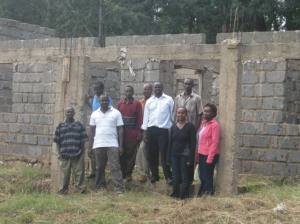
We finished our extraordinary day with Kenera Youth by visiting their soon-to-be completed youth center being built thanks to a government grant. The group asked to be involved closely in the upcoming Road Show so that they might be able to learn more about new technologies that could be disseminated in their community. If they could target specific technologies, be trained in their maintenance and installation, then the center could become a warehouse of knowledge and technology innovation. In the meantime, for our upcoming World Cup event, the group pointed us in the right direction.
The Kirinyanga Technical Institute is the major vocational school in the Embu region and offers a perfect site for a Tech Road Show event. We met with three enthusiastic lecturers who toured us around the campus and described the technical education courses in masonry, water installation, welding, and fabrication as a well as business diplomas and courses in computing and information technologies. They saw the Tech Road Show as an incredible opportunity to bring attention to the importance of technical education, innovation and entrepreneurship.
The 475 student school is growing rapidly, and their 400 acres of land provides more than enough space for a community viewing venue for the World Cup to be set-up. The faculty said their students would be ready to jump on the chance to showcase their institute during the World Cup and they expressed special interested in agricultural technologies, echoing the Kenera Youth’s need for increased innovation in that sector.
We enjoyed our time in Kenya, and can only hope that we can create as many smiles in our next stop in Arusha, Tanzania!
February 6, 2010
Technology Innovation & The Velocity of $$$$
The Road Show crew is traveling through the Rift Valley in Kenya in search of our second locale for a space for the big screen set-up. We spent the last two days in Nakuru, a small junction town five hours from the Ugandan border and four hours from Nairobi. While we are yet to find the right partner or place for our event, the people we have met and the problems we have encountered is sharpening our language on why spreading innovative appropriate technologies in Africa could have a global net benefit.
We met one fellow on the side of the road building chicken coops from used car tires. He was a former soldier who now makes his livelihood by selling the coops at around $4 a piece and around 4 coops per day. The sales provide enough money for him to pay his monthly rent and help feed his family. People buy the coops because when baby chicks hatch they are very difficult to keep in one location and losing them means lost time and revenue.
The recycled tire chicken coop is a great innovation and it’s also increasing the velocity of money in Nakuru. Velocity of money is an economic term that describes how fast money changes from one hand to another. When a farmer uses some of his savings to buy one of the chicken coops, the former soldier receives cash that he in return turn spends at the market to buy fresh vegetables for a family meal. The vegetable seller keeps some of that cash to spend on other necessities, and some of that cash returns to the farmer to buy more vegetables to sell at the market. Now the farmer has increased his/her income and can potentially afford to support more chickens and may in time buy another coop. If the farmer had not purchased the coop and kept the money in savings, the other purchases would have been possible. The theoretical example shows the faster the velocity of money, the more money spreads around the community, and the stronger the economy gets as a whole.
The micro scale example of the chicken coops strengthening economy and livelihoods came back to us while visiting a large farm in the drier area of Nakuru. We were shown a huge field of weeds, where no vegetables can be supported during the dry months from January to April. During this time the price of vegetables on the market goes high because the supplies are limited. Families cut back on their food spending and less vegetables are sold. The farmers have less income, they hold onto their savings, and the velocity of money slows. When introduced the innovations of rain water harvesting, treadle pumps and slow drip irrigation, the farmer agreed that this could boost production during the dry season. If more vegetables could be grown, the price on the market would become more affordable and more sales could be made. The increased income that the farmer received could be invested into more technologies for increased production.
That still left us to consider how to bring the technology innovations sustainability into the community so that they could be maintained and marketed within the cultural context. We got to talking about building this technology economy at Samwell Kironji’s electronic repair shop. Samwell is also a community leader in a local church and we discussed a model that could bring a 21st century technology upgrade. Samwell loved the concept of the road show as a first step, and agreed as Barack Obama said in Ghana, “Africa does not need strong men, it needs strong institutions”. Samwell will think about what steps would be needed to create some type of centralized institution where innovations like rain water harvesting systems could be taught and then offered as a service to the community.
We finished the day by visiting a local school and greeted the future beneficiaries of technology innovation and the increased velocity of African money. While the term “developing community” may be a bogus from a sustainable development point of view, we can happily accept that many African communities have a lot of room to grow, and we will surely need their economies to become a player on the global marketplace if we are to see a recovery from the world wide slow-down…






